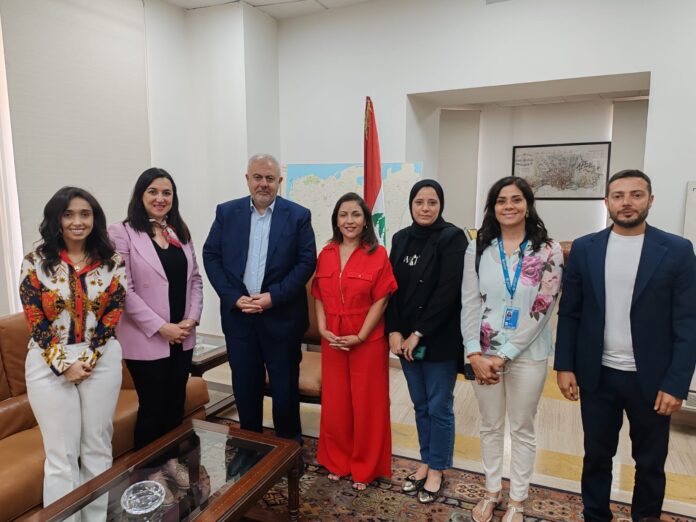Amel Association International is pleased to announce a significant enhancement to its humanitarian response: UNICEF Lebanon has generously committed to covering three years of rent for the Makani Center in Hay El Lejja. Operated by Amel and owned by the Municipality of Beirut, the center is a vital hub providing protection, education, and psychosocial support to children and families living in extreme vulnerability in Beirut.
This critical in-kind donation ensures the sustainability of services already being provided through the center, reinforcing UNICEF’s and Amel’s shared commitment to inclusive, community-based support in Lebanon amid one of the region’s most protracted humanitarian crises.
In recognition of this milestone and to strengthen coordination with local authorities, a joint delegation from Amel and UNICEF visited His Excellency Judge Marwan Abboud, Governor of Beirut, accompanied by representatives from the newly appointed Beirut Municipal Council. During the visit, the delegation shared updates on the center’s ongoing work and expressed deep appreciation for the Governor’s role in supporting child protection and local humanitarian infrastructure.
The Hay el Lejja Makani Center, already fully operational, is part of UNICEF’s wider Makani (My Space) initiative—a multi-sectoral model that brings together education, psychosocial support, child protection, early childhood development, and adolescent engagement under one roof. The center reaches children and caregivers with services that are tailored to the pressing needs of a population battered by economic collapse, conflict, and repeated displacement.
“This renewed support is more than a financial relief—it is an investment in protection, healing, and opportunity for Lebanon’s most marginalized children,” said Dr. Zeina Mohanna, Executive Board Member of Amel Association International. “Thanks to our strong partnership with UNICEF, we are ensuring that this essential space continues to serve as a sanctuary for learning and psychosocial recovery.”
The support to Amel’s Makani Center comes at a time when over 1.3 million children in Lebanon are in need of humanitarian assistance, according to UNICEF’s latest Humanitarian Situation Report. Many children—especially non-Lebanese and those recently displaced—continue to face exclusion from formal education, lack of access to basic services, and exposure to violence and exploitation.
Amel’s center in Hay el Lejja directly responds to this reality, serving children who would otherwise fall through the cracks. Through daily programming, Amel provides non-formal education, structured psychosocial activities, case management, GBV prevention, adolescent mentorship, and nutrition awareness, especially for newly arrived or undocumented families.
Since 1979, Amel Association International has worked as a non-sectarian, grassroots organization responding to emergencies and promoting human rights and social justice across Lebanon. With more than 30 centers nationwide and deep roots in the communities it serves, Amel remains committed to dignity for all—especially in times of crisis.
Makani community centres, supported by UNICEF and implemented with partners such as Amel Association International, are inclusive, multi-service hubs designed to support vulnerable children, youth, and families in Lebanon—particularly those affected by displacement and crisis. These centres provide a safe and holistic space where children and adolescents can access non-formal education, psychosocial support, child protection, life-skills training, and health and hygiene awareness programs. In addition to supporting learning continuity through remedial classes and platforms like the Learning Passport, Makani centres offer vital protection services, mental health support, recreational activities, and awareness sessions on topics such as cholera prevention, breastfeeding, and gender-based violence. With over 50 centres operating across the country, Makani plays a key role in promoting resilience, social cohesion, and dignity among Lebanon’s most at-risk communities.
by April 20205, UNICEF reached a total of 2,351 adolescent girls (11-18) with tailored emergency sessions in Makani centres and shelters across the country. To expand coverage, six temporary Makani centres were established, reaching 3,708 children, including 33 with disabilities, who previously had no access to services. Through its Makani community centres, UNICEF also supported 24,281 marginalised and vulnerable children, youth, and caregivers with multisectoral services, including education, child protection, early childhood development, nutrition, and youth engagement. These combined efforts of UNICEF and partners have ensured access to education to 175,694 children, including 154,398 formal education public school students and 21,296 children in non-formal education programmes.


 Creative Commons Attribution 4.0 International license
Creative Commons Attribution 4.0 International license